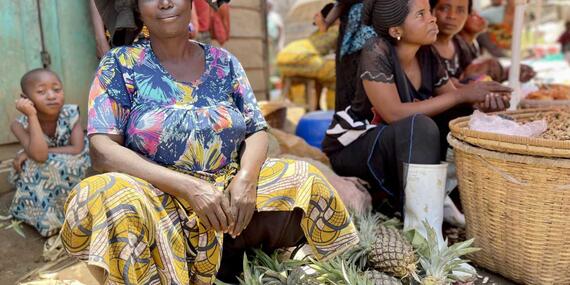Today's top news: Democratic Republic of the Congo, Papua New Guinea, Syria, Türkiye

Democratic Republic of the Congo
Months of violence and insecurity in the eastern province of Ituri and North Kivu have put millions of civilians on the brink of major humanitarian catastrophe.
In North Kivu, persistent fighting between the M23 armed group and the Congolese army (FARDC) has displaced more than 222,000 people between January and February alone, bringing the total to over 880,000 displaced since violence broke out in March 2022.
More than half of these people are living in precarious conditions in churches, schools, hospital premises, makeshift settlements and spontaneous sites in the cities Nyiragongo and Goma and surrounding areas.
In Ituri, dozens of people have died and more than 144,000 people have been displaced between January and February, according to our partners.
There are 6.1 million internally displaced people in the country, 65 per cent of them are in Ituri and North Kivu.
Our colleagues report that violence is also spreading to parts of the country that had remained calm in the past years. This includes the western provinces of Mai-Ndome and Kwilu, which have been plagued by intercommunal violence since June 2022. Hundreds of people have been killed and more than 50,000 people have been uprooted, according to provincial authorities.
As a result of the violence, food insecurity is on the rise in a country that is already home to more than 26.4 million people who struggle to access enough food. Cases of malnutrition and epidemics like measles and cholera are increasing, further stretching the humanitarian community’s capacity to respond.
UN humanitarian agencies and our partners doing our best to mobilize, but the increasing needs are exceeding our response capacities. There is an urgent need for all humanitarian organizations to scale up their operations in areas where needs are the most critical, particularly in the east.
The $2.25 billion appeal for the DRC is currently 10 per cent funded. We urgently need additional resources to avert a looming disaster.
Papua New Guinea
Aftershocks continue to be felt after the magnitude-7 earthquake that struck the Chambri Lake area in the remote East Sepik Province yesterday.
Two people were killed, two others were injured, and 96 homes were destroyed, according to preliminary reports from the district. These numbers are likely to rise as rescue teams reach the area.
The International Organization for Migration and our humanitarian partners are helping with rapid assessments coordinated by provincial authorities. Those assessments may take a few days to complete due to the remote location and limited communication in the affected area. Teams are traveling to Chambri Lake via seaplane, and then on to the affected regions by canoe.
Syria
The UN continues to provide assistance to people affected by February’s earthquakes.
In Government-controlled areas, we and our partners have provided more than 221,000 people with food and nutrition assistance in Aleppo, Lattakia, Tartous and Hama.
In the northwest, we have reached more than 360,000 people with $10.9 million in cash assistance. More than 1,200 trucks carrying aid provided by seven UN agencies have crossed into the northwest Syria since February 9th through the three available border crossings.
The UN has completed 48 cross-border missions to the northwest since the first interagency visit to Idleb in mid-February.
Our three-month flash appeal for the earthquake response in Syria is now 95 percent funded. We thank our donors for their generosity. Meanwhile, our annual Humanitarian Response Plan for $4.8 billion is just 6 percent funded as of today. We urgently need additional funds to help more than 15 million people across the country, who were already in need before the February earthquakes.
Türkiye
We and our partners continue to support the Government-led response to the earthquakes.
As of today, our $1 billion flash appeal for the Türkiye response is 28 per cent funded, and we thank donors for their support so far. However, without adequate resources, it will be challenging to maintain our response and reach all those in need, so we urge all donors to step up and support this critical humanitarian effort.
